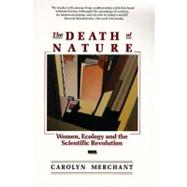The Death of Nature: Women, Ecology, and the Scientific Revolution
, by Merchant, Carolyn- ISBN: 9780062505958 | 0062505955
- Cover: Paperback
- Copyright: 3/17/2010
Nature as FemaleThe world we have lost was organic. From the obscure origins of our species, human beings have lived in daily, immediate, organic relation with the natural order for their sustenance. In 1500, the daily interaction with nature was still structured for most Europeans, as it was for other Peoples, by close-knit, cooperative, organic communities.Thus it is not surprising that for sixteenth-century Europeans the root metaphor binding together the self, society, and the cosmos was that of an organism. As a projection of the way people experienced daily life, organismic theory emphasized interdependence among the parts of the human body, subordination of individual to communal purposes in family, community, and state, and vital lift permeating the cosmos to the lowliest stone.The idea of nature as a living organism had philosophical antecedents in ancient systems of thought, variations of which formed the prevailing ideological framework of the sixteenth century. The organismicmetaphor, however, was immensely flexible and adapt able to varying contexts, depending on which of its presuppositions was emphasized. A spectrum of philosophical and political possibilities existed, all of which could be subsumed under the general rubric of "organic."NATURE AS NURTURE: CONTROLLING IMAGERY. Central to the organic theory was the identification of nature, especially the earth, with a nurturing mother: a kindly beneficent female who provided for the needs of mankind in an ordered, planned universe. But another opposing image of nature as female was also prevalent: wild and uncontrollable nature that could render violence, storms, droughts, and general chaos. Both wereidentified with the female sex and were projections of human perceptions onto the external world. The metaphor of the earth as a nurturing mother was gradually to vanish as a dominant image as the Scientific Revolution proceeded to m







